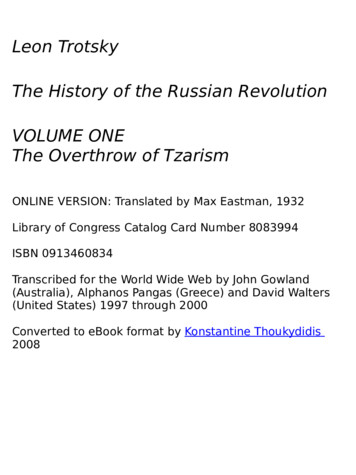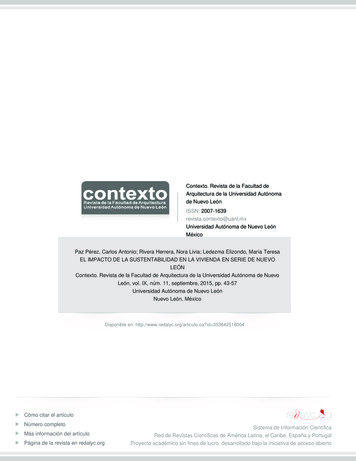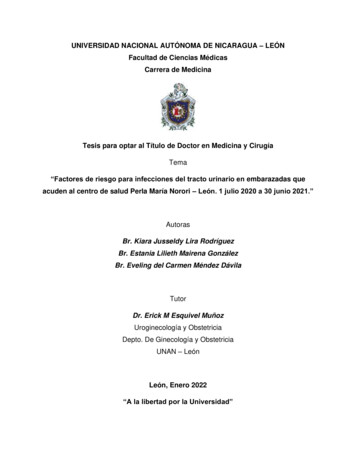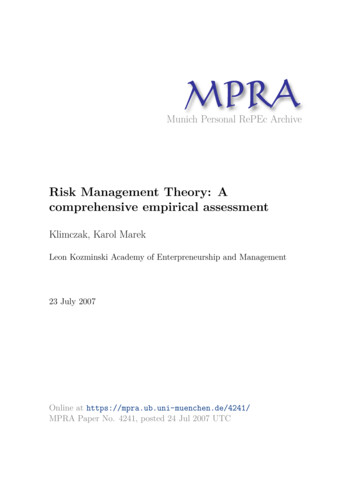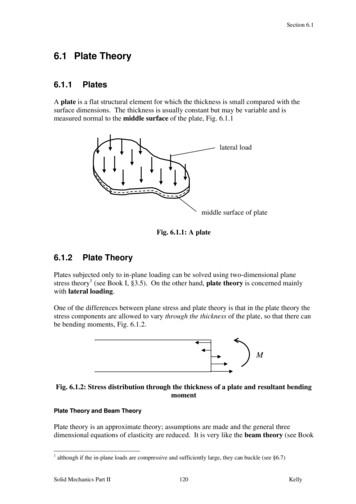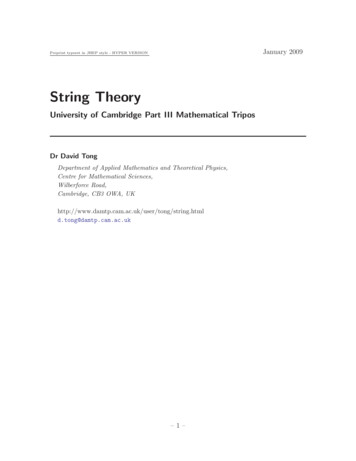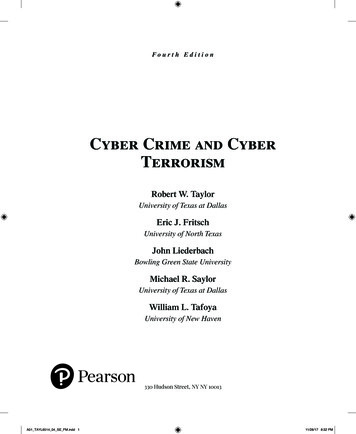
Transcription
LEON TROTSKY'S THEORY OP PERMANENT REVOLUTIONAND ITS INCORPORATION INTOLENIN'S PARTY PLATFORM IN 1917byPenelope Lynn SlacumSubmitted as an Honors Paperin theDepartment of HistoryWoman's College of the University of North CarolinaGreensboro1963
Approved by DirectorExamining Committee
No revolution has ever anywhere wholly coincidedwith the conceptions of it formed by its participantsnor could it do so. Nevertheless the ideas and aimsof those engaged in the struggle form a very importantconstituent element of a revolution.Trotsky
TABLE OP CONTENTSPartI. BACKGROUND OP THE THEORY OP PERMANENT REVOLUTIONII. THE REVOLUTION OP 1905 AND ITS PRACTICAL EXPERIENCE.III. WORLD WAR I AND ITS EFFECT ON LENIN'S THEORIESIV. REVISION OF LENIN'S THEORIES AFTER THE FEBRUARYREVOLUTIONPage172940BIBLIOGRAPHY OP CITED WORKS47BIBLIOGRAPHY OP OTHER WORKS CONSULTED49
I. BACKGROUND OP THE THEORY OP PERMANENT REVOLUTIONThe idea of permanent revolution was first formulatedby Leon Trotsky in 1905.It was based upon an interpretationof Russian history which he found inoompatible with Marx'sarbitrary historical stagessocialism.feudalism, capitalism,Trotsky maintained that in Russia these distinctphases would be combinedinto a continuous revolutionaryprocess culminating in socialism.Consequently Russiansocialists would not have to wait until capitalism hadbeen established before beginning the struggle for socialism.Vladimir Lenin incorporated the basic premises of this theoryInto the Bolshevik party platform in 1917, and after theOctober revolution they were used to Justify the immediateestablishment of a dictatorship of the proletariat.The purpose of this paper is to trace the evolution ofthe theory of permanent revolution from its conception in1905 to its incorporation into Lenin's philosophy in 1917.In the process I shall indicate the practical revolutionaryexperiences which in 1905 made Trotsky's ideas valid and whichin 1917 made them necessary.
- 2 -The theoretical foundation for the theory of permanentrevolution was provided by one of the foremost Marxisttheoreticians, Alexander Helfand (Parvus), an emigrantRussian Jew of an internationalist position within theGerman Socialist Party.1In 1904, Leon Trotsky metParvus in Vienna. There developed a short, but intense,relationship out of which Trotsky's theory emerged.Parvus held the traditional Marxist view that the nationstate had outlived its purpose, but he believed that theEuropean upheaval would come in the near future.Here hediffered from the majority of his colleagues, who were Justthen beginning to enjoy the fruits of legalistic socialistaction within the German Government.Parvus placed emphasison the increasing economic Interdependence or the nations ofEurope and especially on the economic importance of theircolonies.The consolidation of the nation-state and theIncreasing economic barriers between these states could leadonly to open conflict.The Russo-Japanese war, he believed,2was the first of a series of like conflicts for survival.The reason for the prolongation of this outdated system was theinsufficient education of the toiling masses.He attributedthis to the opportunism and passivity of the socialist leadership, who paid less attention to educating the proletariat in1He was a member of the revolutionary left-wing factionled by Rosa Luxemburg, which opposed MjmtfjMitMlMof the German socialist leadership. Bertram Wolfe, Th ee WhoMade a Revolution. (Beacon Press: Boston, 19 9;, p.«jyo.?Isaac Deutscher, TV,P Prophet Armed. (London: OxfordUniversity Press, 19 5), PP-
- 3 -its proper role than to securing time serving politicaldemands.And he was not alone among the revolutionary leftin also condensing its leadership for allowing petty-bourgeoisIdeas to infiltrate into the higher strata of the working class.For it was true that in western Europe at the turn of thecentury many social measures had been adopted and an increasinglyhigh standard of living was evident for certain groups ofworkers.*Thus Parvus turned to colonial upheaval to give impetusto the revolution.The most powerful and advanced European;;countries enslaved whole nations of backward peoples in orderto maintain their capitalist system in operation.Like theEuropean proletariat, these peoples were beginning to representa revolutionary force (Parvus used as a basis for observationparticularly the Indian and Chinese populations), and would soonbe strong enough to rebel against their oppressors.As soonas this happened, the proletariat in Europe would awaken tothe plight of capitalism and unite with its oppressed brothersto bring this stage to its conclusion.Parvus believed that the situation in Russia fitted intothis pattern.Although Russia was, of course, an independentmonarchy, it was economically dependent on western Europe,especially Prance.And since the revolutionary situationIn Russia was most far advanced, it would probably be a Russianrevolution which would set off the socialist revolution in3Ibid,, pp.l04ff.4Ibld. pp. 103-109.
- 4 -Europe.5Paruvs, however, keeping in mind Russia's feudalism,said nothing of a Russian socialist revolution.He did feelthat a European socialist revolution could not fail to speedup the process of capitalism in Russia, and indeed the necessityof dealing with a socialist Europe would require certain immediatesocial reforms to be incorporated in a Russian bourgeoisdemocracy.6Trotsky adopted Panrus' view of the coming socialistupheaval in Europe, especially Russia's role in it.However,he went further to put forth certain ideas concerning Russia'shistory that he believed put her in a unique revolutionaryposition.Russia was a half-Asian, half-European countrywhose history was dominated by continual invasion fromEast and West.Although she had developed as an orientaldespotism, increased pressure from the West had forced her toadopt western methods in order to protect herself.And,Trotsky belielyed, it was this military pressure from superiorpowers and not Russian soclsty that had molded the state.The state bore the brunt of change.This exacted a'thighdegree of energy and a great deal of wealth.5"The worldwide process of capitalist development leadsto a political upheaval in Russia. This in its turn must haveits impact on the political development of all capitalistcountries. The Russian revolution will shake the bourgeoisworld. And the Russian proletariat may well play therole of the vanguard of social revolution. Parvus quoted byDeutscher, p. 112.6Ibid., p. 104.
- 5 A group of landowners, at one time Independent princes,became completely dependent upon the state for protectionwhile at the same time the state needed their wealth to resistexternal powers.This Impeded the growth of wealth Independentof the state and hampered the natural beginnings of capitalism.Therefore, capitalism, which in Europe was the chief antagonistof feudal society, was in Russia a child of the state encouragedfor the purpose of defense.?Trotsky explained that the lackof private wealth which comes from capitalist Industrializationforced the Russian state to turn to excess European capitalin order to finance the degree of modernization necessary tomaintain itself.It was Parvus' belief that Russia possessed no socialclass comparable to the concentrated mass of urban craftsmenwho had formed the backbone of the French middle class and wereresponsible for the French revolution.9Trotsky went on topoint out that the Russian town, like the Asian, was not aproductive organ, but rather a military, and administrativeunit.It neither accumulated wealth nor created a divisionof labor.The reason was the great expanse of thinly populatedterritory which relied on cottage craft and the village society.7Leon Trotsky, History of the Russian Revolution, trans.Max Eastman, (New York: Simon ana" scnuster, 1932;, vol. ill,PP. 365-372.Although the beginning of oapltaliw In Europe was similarto the beginning of capitalism in Russia, Trotsky felt that InRussia it did not arise from the free play of « * 'Jf"*but was a forced change and therefore unnatural. This meant ttotRussian capitalism would differ from European at its base. LeonTrotsky, My Life. (New York: Schribner's Sons, 1931), PP. 221-224.9Trotsky, History of . PP. 369-372.
- 6 These villages acted for the most part as autonomous entities,troubled by the city officials only in times of great stress,for food and military personnel.The advance of modernindustry had no significant effect on the middle class asan Independent force because most of the new industry wastied to foreign investment and controlled by the state.Thebourgeoisie therefore did not represent an independent middleclass tradition based on a common alliance against the government.However, industrialization financed by the governmentdid suffice to bring together a working class body.Also,because Russia had entered the industrial scene late, shebenefited from the most advanced western technology and herworking class was jjiickly Influenced by western socialistactivity.10Prom his association with Parvus, Trotsky gained a beliefIn the imminent European socialist revolution in which Russiawould have a major part.In addition his own analysis ofRussian history led him to reconsider the role of the bourgeoisie as a revolutionary force.He intimates at this pointthat in Russia the working class has more revolutionarypotential than the bourgeoisie.These two ideas will becomebasic to his theory of permanent revolution after the revolution,of 1905.10 Ibid., pp. 228-230.
II. THE REVOLUTION OP 1905AND ITS PRACTICAL EXPERIENCEIt was not until a real revolutionary situation haddeveloped in 1905 that Trotsky saw the necessity of a specificrevision of Marxism.As an active participant in this up-rising, Trotsky was made aware of the actual strength of thepeasantry, the proletariat, and the bourgeoisie.The eventsof 1905 therefore provided concrete experience from whichbe drew when formulating his basic theory of permanentrevolution.To understand Trotsky's attitude and alsorevisions made by Lenin in his main body of theory, it isnecessary to examine the revolution of 1905 in some detail.Conditions in Russia preceding the revolution of 1905were fraught with growing unrest and political agitation.The rapid expansion of Russian industries in the 1890's,made possible by increased European loans, was succeeded bya period of depression in which industrial conflicts wereIntensified.1903 witnessed an expansion of the working classmovement both In scfcpe and Intensity.A strike In the Bakuoil-fields in the summer of 1903 rapidly spread to Tiflis,Batum, and other Caucasian towns, addition there werestrikes in Kiev and Odessa and other southern cities.These
- 8 strikes are important for their intensity ( there was extensivestreet-fighting), but more particularly for their politicalnature.There were increasing demands for constitutionalreforms, especially for a legislative body and a democraticconstltuti6n:i. At the same time the peasants were becoming active.In 1902, in some parts of Kharkov and Poltava provinces, raidsand vandalism caused extensive destruction ( 54 manor houseswere destroyed in Poltava and 28 in Kharkov).In additionstudent disorders and political assassinations spread.2Allof this added to the growing demand for reform from liberalaristocrats.One of the measures which the government feltwould release tension was a short victorious war.However,the Russo-Japanese war had different consequences.The war which began in February, 1904 was a series ofdefeats for the Russian armies culminating in the battleat Muckden in the winter of 1905 and the destruction of theRussian fleet at Tuschlma.Government prestige droppedgreatly, especially among the educated classes.In orderto avoid catastrophe and to divide the opposition, thegovernment made certain limited concessions.In 1904, PrinceSvlatopolk-MirBky was put in charge of the Interior and anAll- Zemstvo Congress was allowed to meet.51William Henry Ohamberlln, The JBfiggj SSaffiffijT1917-1921. (New York: The Macmillan Company, 1935), voi.i.P. 46.2Ibid., pp. 47f.3The Zemstvo was an organization of J&&***** one time laid a basis for a oartaln t of seg-government,but by 1900 their proposals and central organization werecontinually opposed by the government.
- 9 However, at the same time that the gentry was beingappeased, the lower classes were in a state of increasingagitation.The first event of the revolution, popularly-known as "Bloody Sunday',' took place when the priest, Gapon,led a procession of working men in St. Petersburg to petitionthe Tsar for a solution to their grievances.The petitionended with the words: "If Thou wilt not answer our prayerswe shall die here on the Square before Thy palace."4Theguards fired upon the crowds when they would not disperseand caused between 200 and 1500 casualties.The reaction to "Bloody Sunday" was an Intensificationof unrest, expressed in the cities by increasingly violentstrikes in which 64.4 per cent of the strikers were involvedin a political way.A climax was reached in October whenon the twentieth a railroad strike reached three-fourths ofa million workers.The strike was unusual for the predominanceof political objectives free elections, constituentassembly, and amnesty for political prisoners.5By October23, it began to turn Into a general strike which reached eventhe white collar workers, lawyers, Jurists, and severalgovernment officials.Up to this time the activity had hadthe active support, or at least the sympathy, of a majorityVoted in Ohamberlin, p.48. Father George Gapon wasa member of Zubatov's police Erected unionism who had areal attachment to the people and a sincere desire to helpthem.5Ibid., p.46.
- 10 -of the middle class and some landowners.6At this point the government played its hand and on thethirtieth, at Count Sergei Wltte's suggestion, it issued amanifesto intended to pacify all but the most active revolutionaries.Among the provisions was the summoning of aDuma, an elected consultative body.The most significant event of this period was the spontaneousformation of the St. Petersburg Soviet ( the word in Russianmeans council).On October 26, between thirty and fortydelegates of workers and opposition parties met at theTechnological Institute.Although the leadership wasprimarily Menshevik, as a whole the body cut across politicalparties and worked as a single unit.Its primary purposewas to continue and co-ordinate the revolutionary movementwherever the rebellion had taken hold.7It had a short butbrilliant career and brought Trotsky, still of the Menshevikfaction, into prominence as a revolutionary leader.Althoughthe Soviet organized the strikers and sent revolutionaryproposals to the workers, the October manifesto had had itseffect and the tide began to turn.The radicalism of theSoviet threw the gentry and landowners back into the arms ofthe government, and by the middle of December the CentralCommittee of the Soviet was safely Imprisoned in the Peterand Paul Portress.6E.H. Oarr remarks that "employers often encouraged theirworkers to take part in political demonstrations and paid themfor days of absence. The Bolshevik Revolution. 1917-1923.(New York: The Macmillan Company, 1951), vol. I, p.95. Trotsky, History of., vol. I, PP.93-96. For a gooddescription of the personalities involved in the Soviet in1905, see N.N. Sukhanov, The Russian Revolution. (OxfordUniversity Press, 1955).
- 11 However, the narrow franchise of the Duma, and the failureto deal adequately with the land question contributed to thegrowing unrest.The peasants were seriously involved in thecrisis, but were independent of the workers organizations inthe cities.In August peasants' delegates met near Moscowas a Constitutional-Assembly of the All-Russian Peasants'Union.The main feature of their program was the abolitionof private property in land.By November their activity hadbecome more widespread and violent.estates were looted or burned.A total of two thousandThe particular characteristicof this peasant mcremsnt was its class nature, which showedallegiance to the political philosophy of no particularrevolutionary group, nor did it distinguish between friendof foe among the gentry.The peasants felt that the lack ofland was the cause of all their hardships.It was not untilthe return of the peasant soldier at the end of 1905 thatany political ideas were added to their platform.8In St. Petersburg on November 15, a general strike wascalled to secure the eight-hour day.It was not effectiveand was followed by lockouts of the workers, employers' actionwhich pointed up dramatically the changed character of therevolt.The classes were now divided and the governmentforces were able to take advantage of the disunity to restoreorder, though not without considerable bloodshed.OnDecember 19, the Moscow workers in a last desperate effortx8Chamberlln, pp. 47- 9.
- 12 -went to the barricades, led primarily by Bolshevik agitators.This too was suppressed and the revolutionaries went backunderground to reunite their forces. Both the success and failure of the revolutionaryupheaval in 1905 brought forth increased theoretical speculation on tactical proposals for the next revolt.Both Trotskyand Lenin spent many hours writing polemical and theoreticalworks on the events just vitnessed.The conclusions whichthey drew, as will be seen below, were in part manifested froma differing world view.Trotsky was above all a worshipperof reason, his Intellectual route being that of criticalrationalization.This enabled him to grasp the most variedfacts and link them together to a core generalization without losing sight of his directing principle.So it was withhis theory of permanent revolution, an idea which he propounded until his death.Lenin, a revolutionary pragmatist,could never lose sight of a given situation.him everywhere concrete.Truth was toThus the dictatorship tff theproletariat and the peasantry was a truth as long as it wasa necessity.Trotsky perhaps gazed upon a distant goal toofixedly, thenay overlooking present necessities, but by lookinginto the distance he saw the straightest path.While Trtosky was in the Peter and Paul fortress awaitingtrial, he wrote the book, fiur Revolution, stating what heIbid., pp. 48-51.
- 13 determined to be the revolution's practical and theoreticalresults.This is the first time he formulated fully thetheory of permanent revolution.10We have already mentionedTrotsky's analysis of Russian history.Those conclusions werenow bolstered by the events of the 1905 revolution itself.The experience of 1905 showed that the bourgeoisie was bothtoo feeble and too frightened of the proletariat to directits own war against autocracy.It -realized its weakness as aclass and was forced to turn back to the autocracy for protection iagalnst the socially more mature proletariat.Theproletariat, on the other hand, was more advanced than, forexample, its counterpart in Germany in 1848, for it hadalready assimilated the teachings of European socialism.Itsorganization and social awareness, as seen by its boldnessin 1905, promised its leadership in the coming revolution.Once having seized power for the bourgeoisie, could thisclass then relinquish the government to its class enemiesin order for them to restore a feudal regime under theguise of constitutionalism?10Rather Trotsky felt that afterTrotsky explains: " This abstruse term (permanentrevolution) represented the idea that the Russian revolution,whose immediate objectives were bourgeois in nature would not,however, stop when these objectives had been achieved. Therevolution would not be able to solve its Immediate bourgeoisproblems except by placing the proletariat in power. And thelatter, upon assuming power, would not be able to confineitself to the bourgeois limits of the revolution. Thecontradiction in the position of a workers' government in abackward country with an overwhelming majority of peasantscan be solved only on an international scale, in the arena ofthe world proletarian revolution'.' quoted in Joseph Stalin,Leninlsmt Selected Writings. (New York: International Publishers,Company, Inc,, 1 42J, p. 15.
14 -the revolutionary proletariat had gained power, in thebourgeois-democratic stage, it would begin immediately toenact social legislation in keeping with its class consciousness.The bourgeois capitalists would be unwilling to accept suchaction.They would close down their factories.The proletarianleadership would then be forced to take over ownership ofthese factories, thereby perpetuating ltsfclf in power asa workers' and not a bourgeois government.This speculationwas again the direct result of Incidents in 1905.11Trotsky did realize that a proletarian dictatorship wouldbe a dictatorship of a minority, something he had only recentlycondemned with regard to Lenin's centralization plan.12Trotsky's world view,however, led him to believe that, withthe majority of the European world under the control of thedictatorship of the proletariat, going back to Parvus,theworkers of Russia would join hands with these more sociallyadvanced workers.Out of their class alliance the gains ofthe Russian revolution would be perpetuated, and the processof socialization and industrialization in Russia accelerated.ETrotsky was not here advocating a leap past the bourgeois11 Wolfe,pp. 154ff.12P"Trotsky was opposed to Lenin's plan for a revolutionaryparty made up of professional revolutionists while the massesand more elementary organizations would be controlled by thisunderground group of professionals. Trotsky took the side ofthe Mensheviks who wanted the Party to extend to these massesand subsidiary organizations.13Deutscher, pp. 155-149.
- 15 stage.He believed that the revolution was not a series ofspecifically defined stages, but a continuous process in whichphases would dove-tail and be telescoped into continuous revolutionary action. "Between the minimum and maximum programmesof social democracy, a revolutionary continuity is established.This Is not a single stroke, it is not one day or one month, itIs a whole historical epoch. " Trotsky manifested an obvious mistrust of the peasantrywhich perhaps came from his anti-populist and pro-internationalMarxist ideals.He did believe that the peasantry was adistinct revolutionary force, evidenced by the growing landrevolution in the late months of 1905.Nevertheless, he feltthat as an independent revolutionary body, the peasantry wasincapable of any long range theoretical ideas.He thereforeconcluded that it was the task of the educated proletariatto direct the revolutionary ardor of the peasantry as longas peasant demands were in accord with proletarian revolutionaryinterests.However, the proletariat should realize that,when the petty-bourgeois desires of the peasants were satisfied, they would become passive to the increased revolutionaryactivity of the workers.Later when the proletariat beganto recognize certain of its revolutionary goals, for examplethe collectivization of agriculture, the peasantry would becomereactionary.With the Russian revolution thus endangered,only a world-wide proletarian revolution could safeguardRussia efforts. 1514 Trotsky as quoted by Oarr, vol. I p.51.' Deutscher, loc. cit.
- 16 The experience of 1905 had direct bearing upon Trotsky'sview of the peasantry.He noted that it was in the townsthat the revolution would receive its first impetus, and inthe towns that revolutionary initiative would establish newworkers' governments.The country masses would be drawn inat a later date by the revolutionary energy of the workers."The proletariat will appear before the peasantry as itsliberator."In addition he realized that it was thepeasant- in- uniform who had finally defeated the 1905revilution by siding against the worker in favor of theTsar.He therefore assumed that the conservatism of thepeasantry would not allow it to take an independent stand,that only the radicalism of the working class could spurthe peasant to action.For this purpose, he advocated thatpeasants! Soviets be set up in the villages on the pattern ofthe workers' Soviets in the cities.Trotsky was fully awarethat the revolution could not succeed without the supportof the peasant majority, and along with Lenin he advocateddistinctly peasant measures such as nationalization of the17land to lure them away from the bourgeoisie.At the same time that Trotsky was fottmulating theseideas, Lenin was incorporating into his program the practicalresults of 1905.The revolution had given him a basis forrevising many of his former prejudices, particularly concerning the revolutionary capacity of the peasantry. In the1617Trotsky quoted in Ibid. p. 155.Trotsky, History of., vol. Ill, p. 393.i
2 ff *Development of Capitalism In Russia. 1899, Lenin had set outto show that the old Russian peasant commune was breaking downinto divisions of petty-bourgeois and laboring peasants (thosewith land and those without).In order to meet with traditionalMarxist theory, Lenin laid especial stress on the petty-bourgeois nature of the landed villager.The growing peasantunrest In 1905, however, caused Lenin to recognize a hithertolatent revolutionary potential.While both he and Trotskyagreed that this potential must be harnessed, they disagreedon what was to be done.I& 1905, when the Duma was called,Lenin found that the peasantry, for lack of a suitable politicalparty18, elected representatives of bourgeois parties or, moresignificantly, members from its own midst.The radicalnessof these peasant representatives can be seen in the words ofone of them on the Duma floor:We are told. that property is sacred, inviolable.In my opinion it cannot possibly be inviolable,nothing can be inviolable one the people will it.Gentlemen of the gentry, you have stolen our land.This is what the peasants who sent me here say:'The land is ours, we have come here not to buyit, but to take it.'"19Indeed ., if carefully perused, peasant social history is arecord of long periods of abject passivity alternating withabortive, albeit violent, rebellions.Count Wltte, one ofthe most able administrators of the period, admitted that". the most important part of the Russian revolution of18Both the Bolsheviks and the Mensheviks refused totake part in the elections to the first Duma.19Quoted in Wolfe, p.350.
- 18 1905 was. in the slogan of the peasantry: 'Give us land.'"20To this end the Prime Minister,P.A. Stolypin, succeededin instituting certain land reforms which he hoped wouldfurther tie a certain segment of the peasantry to the regime.At the Stockholm Conference in 1905, Lenin brought attentionto this and concluded his remarks by calling for the radicalmeasure, nationalization of land, intended to persuade themajority of the peasants to support the Bolshevik platform.21By nationalization Lenin referred to "the transfer of allland into State property.Property means the right to arent, and the determination ofl the part of the stateauthority of the rules concerning possession and use of theland, which are valid for the entire state."22In otherwords Lenin meant this measure to be democratic and inkeeping with the bourgeois phase :, rather than the socialist.More importantly, in his pamphlet, Two Tactics of SoolalDemocracy In the Democratic Revolution. 1906, Lenin called foran alliance with the poorest peasantry as a measure necessaryfor the success of the bourgeois revolution.Lenin andTrotsky agreed on the necessity of combining the proletarianforces with the peasant.However, they were of diverseopinions as to the exact relation between the two classes.Lenin advocated an alliaace in which a peasant party and aproletarian party would work in equal coalition, whereas20Trotsky, My Life, p.175.21Vladimir Ilyich Lenin and Leon Trotsky, ProletarianRevolution In Russia. (New York: International PublishersCompany, inc.,1915J, p.135.22Ibld. pp.139f.
- 19 Trotsky believed that an enlightened proletariat should leadthe peasantry.23One can assume that Lenin, for tactical reasons,did not articulate the desire that his party leadership shouldin actuality direct such an alliance.However, he did referto such an idea several times. "We support the peasant movementto the end, but we ought to remember that this is the movementof another class, not that class which can and will achievethe socialist revolution." 24 This is only the first in aseries of tactical manoeuvres in which Lenin advocatedmeasures contrary to Trotsky's views while at the same timemoving logically toward them.The second tactic stressed in the pamphlet was "lastbut not least to carry the flames of revolution acrossEurope." - With this all Russian Social Democrats agreed.Trotsky, we have said, believed that the revolutionaryupheaval In Russia would upset the western economic systemand stir the proletariat to action, which in turn, -.mouldprotect the nascent socialist revolution in Russiaa.2 23Both theoretically ascribed to Tkachev"s belief that:". neither in the present nor In the future can the people,left to their own resources, bring into existence the socialrevolution. Only the revolutionists can accomplish this.Social ideals are alien to the people(peasants;; they belongto the socialist philosophy of the revolutionary minority(enlightenedproletariat). quoted by Wolfe, p.364.24Lenin quoted in Tribtsky, History of. vol. Ill, p.355. Vladimir Lenin, Collected Works, authorized Eng. trans.Lenin Institute, Moscow,(New York: International PublishersCompany, Inc., 1929), vol. VII, p. 186.26Trotsky, My Life, p. 18.
- 20 Lenin went further to propound that only a revolution inEurope would enable a socialist revolution to begin in Russia;and he reiterated the words of Marx that, ". the industriallymore developed country shows the less developed only the imageof its own future."27Like most Me
would release tension was a short victorious war. However, the Russo-Japanese war had different consequences. The war which began in February, 1904 was a series of defeats for the Russian armies culminating in the battle at Muckden in the winter of 1905 and the destruction of the Russian fleet at Tuschlma. Government prestige dropped


